Learn more about our appointment options, get a second opinion, find a convenient location, request a referral, and get additional support resources.

AHN Heart Transplant Program
Heart transplant surgery is a life-saving option for patients with severe heart failure who haven't responded to other treatments. While a heart transplant is major surgery, it offers excellent recovery chances with proper care.
The first heart transplant program in Pennsylvania
Established in 1985, our team of experienced specialists has performed more than 500 heart transplants.
The AHN Heart Transplant team guides patients through a process that consistently exceeds national standards with shorter wait list times, a higher percentage of heart transplants for patients on our wait list, and high transplant patient survival rates.
Heart transplant patients work with a multidisciplinary team of physicians, surgeons, dietitians, social workers, and pharmacists who collaborate to get the best possible outcomes.
You’ll also get one-on-one support from dedicated transplant nurse coordinators, who guide you through the transplant process and are readily available to answer questions.
-
Appointments
Heart Transplant Program
Focused on your needs
AHN Heart Transplant Program specialists work together to provide comprehensive care for heart failure, including:
- Cardiovascular rehabilitation: This medically supervised program can help improve your heart health and overall fitness, making you a stronger candidate for a heart transplant and improve your post-transplant recovery.
- Tailored medication therapy: When you’re getting ready for a heart transplant, we’ll tailor your immunosuppressant therapy to factors like age, gender, race, and health status. This can lower your chances of infection and organ rejection post-transplant.
- Mechanical circulatory support: This includes ventricular assist devices, which support your heart’s circulation while you wait for a donor heart.
- Multiple organ transplants: Our transplant surgeons are exceptionally skilled at performing simultaneous organ transplants for hearts and kidneys.
- Donation after cardiac death (DCD) heart transplantation: This approach uses hearts from donors who have experienced irreversible cardiac arrest, using rigorous criteria and advanced preservation techniques to ensure their safety and viability. DCD has decreased heart transplant list wait times nationally, giving more people the chance for life-saving transplants.
- Access to clinical trials: The AHN Cardiovascular Research Institute’s focus on innovation gives you access to clinical trials for new anti-rejection medications and other therapies. Learn more about how to enroll in our clinical trials.
Learn more about the treatments for heart failure and what to expect if you have been referred to AHN for a heart transplant.
Heart transplants are typically reserved for patients with severe, irreversible heart failure, where the heart muscle is so weakened it can no longer pump blood effectively.
There are several conditions where heart transplant surgery may be the right treatment. These include:
- Cardiomyopathy: This condition weakens the heart muscle and makes it harder for the heart to effectively pump blood. Cardiomyopathy can lead to a variety of symptoms, including shortness of breath, fatigue, and swelling in the legs and feet.
- Coronary artery disease: This condition happens when plaque builds up inside the arteries that supply blood to the heart, causing them to narrow and restrict blood flow and oxygen. Coronary artery disease can cause chest pain, shortness of breath, and even lead to a heart attack if an artery becomes completely blocked.
- Heart valve disease: This condition occurs when one or more of the heart’s four valves, which control blood flow to the heart, do not work properly. Valves can narrow and restrict blood flow, or leak and cause blood to flow backward. Heart valve disease can cause symptoms like fatigue, shortness of breath, chest pain, and irregular heartbeat.
- Congenital heart defects: Structural heart defects that are present at birth can range from minor to severe and affect the heart’s chambers, valves, or blood vessels. They happen during fetal development and can be caused by genetic factors, environmental influences, or a combination of both.
- Ventricular arrhythmias: These are irregular heart rhythms that come from the ventricles or lower chambers of the heart. They can range from harmless to life-threatening, depending on how often they happen, their duration, and their severity. Ventricular arrhythmias can cause dizziness, rapid heartbeat, shortness of breath, or sudden cardiac arrest.
Failure of a previous heart transplant
If a heart transplant fails, a second heart transplant is the only treatment. Heart transplants can fail for several reasons, including:
- Rejection: The body's immune system may attack the transplanted heart, which damages it and causes it to eventually fail. This is the most common reason for transplant failure.
- Infection: When infections develop in the heart or surrounding tissues, it can lead to transplant failure.
- Cardiomyopathy: This condition weakens the heart muscle and may cause a transplant to fail.
- Coronary artery disease: This condition restricts blood flow to a transplanted heart and can lead to a heart attack if arteries are completely blocked.
- Long-term complications: Occasionally, complications from the first surgery or immunosuppressant medications can also contribute to transplant failure.
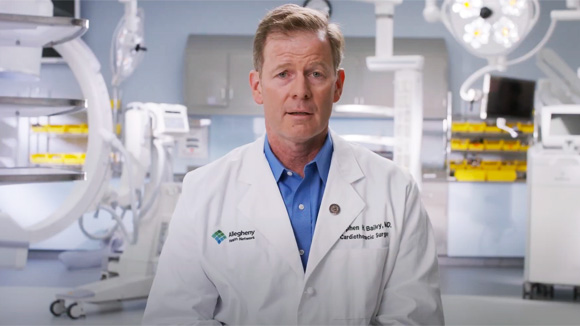
“We’re committed to providing the best therapies and the best experience for patients in what is often a really scary and challenging time.”
– Stephen H. Bailey, MD, System Chair, Department of Thoracic and Cardiovascular Surgery
By accessing this video, I understand that I am leaving the AHN website and I will be re-directed to an external website operated by a third party platform provider. I acknowledge that the platform provider may collect personal information about me, and about the video that I view, on their platform and may use and disclose this information in accordance with its privacy policy. I agree that Allegheny Health Network is not responsible for the data collection and use practices of this third party.
Our highly skilled heart failure specialists, cardiovascular surgeons, mechanical circulatory support specialists, and physicians have decades of experience working together to provide you with the best possible outcome.
Our heart transplant program is led by:

Chair, Cardiovascular Institute, Chair, Dept. of Thoracic and Cardiovascular Su...

Akshay Khandelwal, MD, MBS, FACC, FSCAI
Chair, Department of Cardiovascular Medicine
And includes:
Cardiac surgeons

Co-Director, Aortic Surgery Clinic

Surgical Director, CTEPH Program
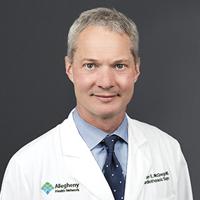
Director, Division of Cardiac Surgery, Director, Robotic Heart Surgery

Surgical Director, Heart Transplant Program
Cardiologists
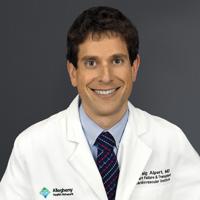
Director, Amyloidosis and Hypertrophic Cardiomyopathy Clinic

Director, Heart Failure Care Model
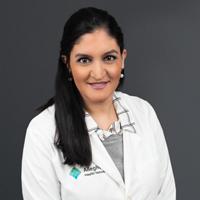
Director, Heart Failure Fellowship Program
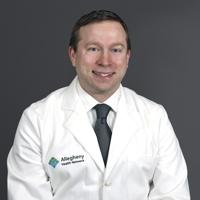
Director, Mechanical Circulatory Support Program

Regional Medical Director, CVI East
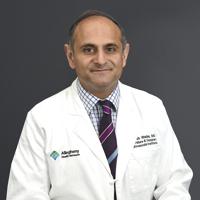
Co-Director, Division of Heart Failure
Other team members
Within the Heart Transplant Program, patients have access to:
- Transplant nurse coordinators, who manage appointments and tests, coordinate care with other team members, provide emotional support and answer questions, and educate patients about their care plan.
- Dietitians, who provide patients with personalized nutrition plans to ensure they get the right balance of nutrients to support their healing and prevent complications.
- Financial coordinators, who help patients navigate the complex financial aspects of transplant care, discussing insurance coverage, potential out-of-pocket costs, and available financial programs.
- Pharmacists, who manage the complex medication regimens for transplant patients, including monitoring drug interactions and educating patients on how to take their medications safely.
- Social workers, who provide emotional support and practical assistance to patients and their families by connecting them to support groups and resources and helping them navigate the transplant process.
Supportive care
This range of services is designed to improve the overall well-being of transplant patients, including:
- Cardiac rehab to improve heart function and learn how to manage their new heart and lifestyle.
- Mental health counseling to address anxiety, depression, and other emotional challenges.
- Physical therapy to help patients get their strength and mobility back.
- Occupational therapy to help patients with daily living activities.
- Spiritual care to provide emotional and spiritual support through the transplant process.
- Support groups to connect patients with others that have had or are going through the same experience.
Knowing who to call to make the correct appointment depends on whether you have a current end stage heart failure diagnosis.
If you do not have a current end stage heart failure diagnosis but are concerned about your heart health, you can make an appointment with your primary care provider (PCP) to talk about your concerns and next steps.
To get started, call (412) DOCTORS (412) 362-8677 to schedule your appointment.
If you do not have a PCP, you can find one near you and schedule an appointment to talk through your options.
Heart transplant program appointments
The AHN Heart Transplant Program offers appointments for those who have a heart failure diagnosis, including end stage heart failure, or are looking for a second opinion.
To get started, call (412) DOCTORS (412) 362-8677 to make an appointment with our advanced heart failure cardiologists.
Learn what to expect at your appointment based on your specific situation:
Diagnosed with heart failure
Our team will provide a comprehensive evaluation and discuss your treatment options, including medical management, mechanical heart pump, or heart transplant.
Diagnosed with end stage heart failure
In addition to evaluating your condition and discussing your treatment options, a specialized nurse coordinator will work with you and your caregiver(s) to complete testing, discuss results, and help you navigate the process.
Looking for a second opinion
If you have been diagnosed with heart failure and are looking for a second opinion, we’ll work with you to evaluate your condition and discuss your treatment options. Even if you are on the heart transplant list with another hospital, we may be able to help you by adding you to our list.
Preparing for heart transplant surgery
If heart transplant surgery is the right treatment option for you, we will add you to the national transplant wait list. While you wait for an appropriate match, our transplant nurse coordinator will work with you on your overall health and connect you with our surgeons, cardiologists, nurses, social workers, financial coordinators, dietitians, and supportive care as needed.
We center our patient care around you and your caregiver(s) and are always available to answer any questions you have throughout the process.
If your health changes, we will adjust your status on the wait list. When a heart becomes available for your transplant, your transplant nurse coordinator will contact you and help you through each step of your heart transplant.
After your transplant and throughout your recovery, our team will continue to monitor your health and work with you every step of the way.
The AHN Cardiovascular Research Institute is established on more than 100 years of innovation with diverse areas of focus, including research for the latest heart disease treatments and cardiac technology. Our qualified team and heart failure specialists take pride in using state-of-the-art devices, technology, and therapies to help revolutionize care for cardiovascular disease.
What is a clinical trial?
Clinical trials are special research opportunities that explore medical treatments, strategies, or devices to ensure they’re safe and effective for human use.
Active cardiovascular clinical trials
By prioritizing research and innovation, our physicians and patients are engaged in more than 100 national and international clinical trials. Participating in these trials gives AHN patients special access to some of the newest potential treatment options for cardiovascular disease and aortic disease. Participation in clinical trials is based on meeting eligibility criteria.
To express interest in a clinical trial or to learn more about research opportunities, check out our active cardiovascular clinical trials.
Our Advanced Heart Failure, Transplant, and Mechanical Circulatory Team provides an innovative approach to patient-centered care. Using the latest research, we tailor care to each patient, decreasing wait times and the number of invasive procedures associated with transplant, ultimately improving survival rates while patients are on the transplant list.
Patient referral criteria
If you have a patient diagnosed with heart failure on guideline directed medical therapy, you can:
- Call (412) 359-6444 to schedule an appointment for them with our advanced heart failure cardiologists.
- Call (412) DOCTORS (412) 362-8677 to start the referral process for a heart transplant.
For either referral, you will need to provide the patient’s name and date of birth.
If you have any questions about independent physician referral, see our frequently asked questions and answers.
Independent physicians who want to follow their patient's progress
Once your patient is receiving care from an AHN specialist, you can view their test results, see their treatment plan, follow their treatment progress, and collaborate with our team using the EpicCare® Link™ platform.
If you are new to EpicCare Link or are having trouble accessing your account, you can request a new account or get answers about an active account.
Releasing medical records to EpicCare Link
If you can’t access your patient's AHN test results through the EpicCare Link platform, your patient will need to complete and submit the correct AHN Medical Records Release form based on their state of residency. You can download and print this form for your patients. Use the following medical records release forms for:
EpicCare® is a registered trademark of Epic Systems Corporation and used with permission.
EpicCare® Link™ is a trademark of Epic Systems Corporation and used with permission.

